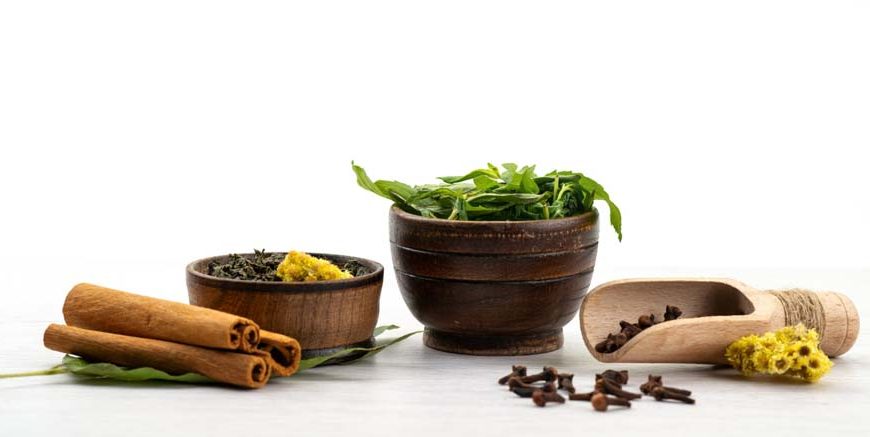In India, the monsoon season is a time of relief from the heat and dryness of summer. Everything turns green and lush. But it also brings some health challenges. This time of year also means bugs — lots of them. Moist weather is an ideal breeding ground for insects that cause illness as per ICMR. These diseases can range from the ones spread by mosquitoes, like malaria and dengue, to waterborne illnesses caused by contaminated food or drink.
We’re always worried about protecting our loved ones from unseen dangers associated with monsoons. Luckily, there are many immune-boosting herbs within Ayurveda, which is an ancient Indian medical system; let me tell you about some powerful Ayurvedic infection fighters that can help keep infections at bay on those rainy days.
Tulsi (Holy Basil):
Known as “queen among herbs” tulsi has been praised since ancient times for its many medicinal properties & health benefits – such as boosting immunity against different types of bacterial or viral infections etc., eugenol content makes it good herb for sore throats caused by bacteria or viruses and even fever due to any kind including those caused by. Tulsi is considered one amongst best immune boosting herbs in India so far as infection curing is concerned then there would hardly be anything else better than this!
Drinking Tulsi tea daily strengthens body resistance against pathogens while also soothing sore throats infected with viruses and reducing the intensity or duration of any viral fevers. Additionally, its adaptogenic nature helps manage stress levels, thereby vitalizing a strong immune response.
Neem:
Neem, referred to as “wonder leaf,” is another potent ayurvedic herb having wide spectrum healing capabilities that are useful especially during monsoons when people are prone more towards getting skin-related ailments due to fungal or bacterial overgrowth etc., Neem leaves can be used internally i.e., consumed in form capsules or applied externally i.e., neem oil on skin surface. It detoxifies the body and purifies the blood stream thereby enhancing overall health besides preventing different kinds of infections. Neem’s efficacy against treating skin infection is remarkable because it relieves itchiness caused by rashes thus accelerating the healing process. Looking for herbs for infection? Look no further than neem.
Giloy (Guduchi):
Giloy also called Guduchi acts as an excellent immunity booster herb in Ayurveda which is particularly recommended during rainy days since it helps fight back viral & bacterial attacks more effectively than any other time. This plant contains high levels of antioxidants along with anti-inflammatory and antipyretic properties that are useful for reducing fever as well as strengthening the immune system against various diseases occurring frequently during this season.
Regular consumption of Giloy juice or capsules gives protection from common monsoon problems like colds, flu etc., while also improving respiratory functions.
Turmeric:
Turmeric being the golden spice of India has been widely used for its medicinal values since ancient times and is known to possess a diverse range of curative powers therefore regarded as an essential ingredient for infection treatment according to Ayurvedic principles too. The active compound in turmeric called curcumin exhibits strong anti-inflammatory, antioxidant, and antimicrobial actions, making it useful against many types of infective conditions.
Drinking warm milk mixed with powdered turmeric or adding sufficient quantities of this herb daily cooking can cure throat infection, intestinal infection and even skin related ones too sometimes. Its ability to stimulate immunity to fight off pathogens makes it a natural preventive remedy for all sorts of infections especially those prevalent during monsoons as per ayurveda tradition followed here for centuries together now.
Ashwagandha
Also called Indian Ginseng, Ashwagandha is a strong adaptogen that aids in stress management and boosts overall immunity. It is highly effective against viral infections. Not just that, it also helps in the general recovery of the body from diseases.
Amla (Indian Gooseberry)
Did you know that amla is known for its ability to boost the immune system? This is mainly due to its richness in vitamin C, which acts as an antioxidant. It also helps fight off infections, especially throat and intestinal ones, because it has antimicrobial properties. It neutralises free radicals, therefore improving health in general.
When included in one’s diet, either through drinking juice made out of fresh amlas or using powdered form mixed with other foods like curries, etc., this fruit enhances immunity, thereby protecting against many common ailments.
Ginger
Ginger, which you may find around your kitchen area happens to be among the powerful ayurvedic herbs having wide range uses for medicinal purposes too. Its anti-inflammatory effects make ginger suitable for use when handling bacterial infections including those affecting the throat or intestines.
Drinking tea made from crushed pieces of ginger root mixed with hot water can relieve symptoms associated with cold such as sore throat, while at the same time promoting the digestion process even more than before.
Manjistha
Another name given to Manjishta herb is Indian Madder since, apart from being a potent blood purif, itier also strengthens defence mechanisms naturally found within our bodies. It is most effective in dealing with skin infections and boosting overall skin health . This herb possesses anti-inflammatory properties that help detoxify b,lood thereby reducing skin conditions.
Mulethi (Licorice Root)
Mulethi, also known as licorice root acts as an expectorant so it is useful for treating respiratory tract disorders such as bronchitis, asthma etc caused by excessive coughing due to its soothing effect on mucous membranes lining these areas. Additionally, this plant has anti-inflammatory properties that prevent various infections from occurring in our bodies.
Drinking tea made out of crushed mulethi roots mixed with hot water can offer relief against sore throats caused by bacterial or viral agents while at same time enhancing general respiratory health through clearing off phlegm blocking air passages within lungs.
In Conclusion
As monsoons bring relief but also present health risks, there is a need to adopt Ayurveda wisdom, which can greatly help us at this point. These medicinal properties found in ayurvedic herbs can potentially boost our immune systems without causing any harm and hence protect us from getting infected naturally. They provide a wider coverage against bacteria, viruses, fungi, parasites, or worms responsible for causing diseases ranging from inflammations, throats, and intestines skins, among others, thus making sure we remain healthy always even when surrounded by sick individuals.
Remember that a qualified practitioner should be consulted before starting these medications, particularly if one has an underlying condition or is taking other drugs concurrently; otherwise, the whole body may become toxic over time due to the accumulation of toxins resulting from improper use of this type of drug. Let us take advantage of this season by making good use of these herbs so that we can enjoy our lives more fully while remaining healthy inside out.
EuroKids understands how crucial strong immunity is during monsoons for children’s health. Our early childhood education is holistic in nature and includes physical wellness as well as natural health care practices. Visit EuroKids today to learn more about our programs and how we prioritise your child’s health.
Sources:
BUJUNE03new (icmr.nic.in)
Monsoon health: Ayurvedic herbs and tips to enhance your wellbeing | Health News – The Indian Express
1 new message (ayurvedacollege.net)















